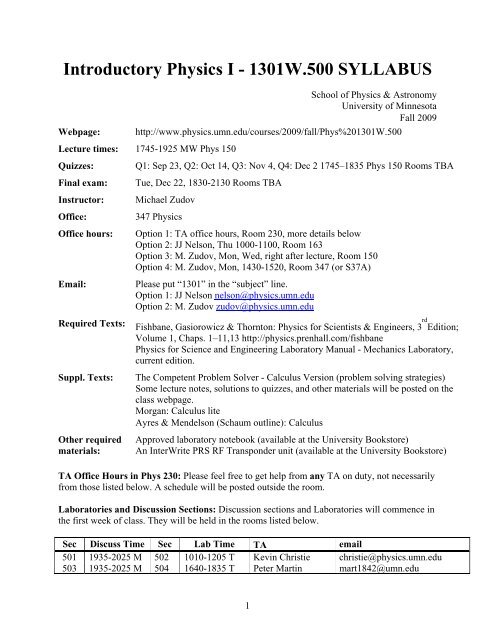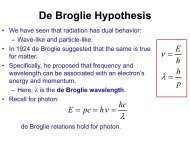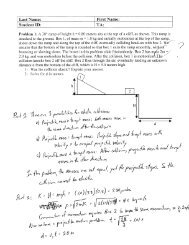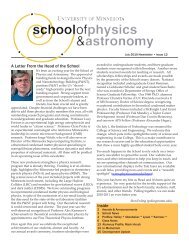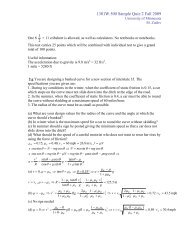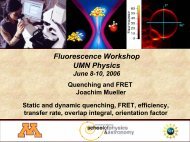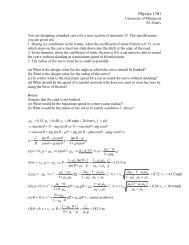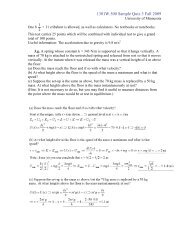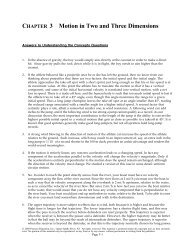1301W.500 SYLLABUS - School of Physics and Astronomy ...
1301W.500 SYLLABUS - School of Physics and Astronomy ...
1301W.500 SYLLABUS - School of Physics and Astronomy ...
- No tags were found...
Create successful ePaper yourself
Turn your PDF publications into a flip-book with our unique Google optimized e-Paper software.
Introductory <strong>Physics</strong> I - <strong>1301W.500</strong> <strong>SYLLABUS</strong>Webpage:<strong>School</strong> <strong>of</strong> <strong>Physics</strong> & <strong>Astronomy</strong>University <strong>of</strong> MinnesotaFall 2009http://www.physics.umn.edu/courses/2009/fall/Phys%20<strong>1301W.500</strong>Lecture times: 1745-1925 MW Phys 150Quizzes:Final exam:Instructor:Office:Office hours:Email:Required Texts:Suppl. Texts:Other requiredmaterials:Q1: Sep 23, Q2: Oct 14, Q3: Nov 4, Q4: Dec 2 1745–1835 Phys 150 Rooms TBATue, Dec 22, 1830-2130 Rooms TBAMichael Zudov347 <strong>Physics</strong>Option 1: TA <strong>of</strong>fice hours, Room 230, more details belowOption 2: JJ Nelson, Thu 1000-1100, Room 163Option 3: M. Zudov, Mon, Wed, right after lecture, Room 150Option 4: M. Zudov, Mon, 1430-1520, Room 347 (or S37A)Please put “1301” in the “subject” line.Option 1: JJ Nelson nelson@physics.umn.eduOption 2: M. Zudov zudov@physics.umn.eduFishbane, Gasiorowicz & Thornton: <strong>Physics</strong> for Scientists & Engineers, 3 rd Edition;Volume 1, Chaps. 1–11,13 http://physics.prenhall.com/fishbane<strong>Physics</strong> for Science <strong>and</strong> Engineering Laboratory Manual - Mechanics Laboratory,current edition.The Competent Problem Solver - Calculus Version (problem solving strategies)Some lecture notes, solutions to quizzes, <strong>and</strong> other materials will be posted on theclass webpage.Morgan: Calculus liteAyres & Mendelson (Schaum outline): CalculusApproved laboratory notebook (available at the University Bookstore)An InterWrite PRS RF Transponder unit (available at the University Bookstore)TA Office Hours in Phys 230: Please feel free to get help from any TA on duty, not necessarilyfrom those listed below. A schedule will be posted outside the room.Laboratories <strong>and</strong> Discussion Sections: Discussion sections <strong>and</strong> Laboratories will commence inthe first week <strong>of</strong> class. They will be held in the rooms listed below.Sec Discuss Time Sec Lab Time TA email501 1935-2025 M 502 1010-1205 T Kevin Christie christie@physics.umn.edu503 1935-2025 M 504 1640-1835 T Peter Martin mart1842@umn.edu1
505 1935-2025 M 506 1745-1940 T Xin Zhang xzhang@physics.umn.edu507 1935-2025 M 508 1850-2045 T Brian Howard howa0236@umn.edu509 1935-2025 M 510 1010-1205 W Sener Ozonder ozonder@umn.edu511 1935-2025 M 512 1935-2130 W Alex Nugent nugen019@umn.edu513 1935-2025 M 514 0800-0955 T Dauda Maw<strong>and</strong>a mawan002@umn.edu515 1935-2025 M 516 0905-1100 Th Barun Dhar dhar@physics.umn.edu517 1935-2025 M 518 1115-1310 T Ehua Fan fan@physics.umn.edu519 1935-2025 M 520 1430-1625 W Xiangwei Tang xtang@physics.umn.edu530 2035-2125 M 531 0905-1100 T Xiangwei Tang xtang@physics.umn.edu532 2035-2125 M 533 1640-1835 T Alex Nugent nugen019@umn.edu534 2035-2125 M 535 1850-2045 T Barun Dhar dhar@physics.umn.edu536 2035-2125 M 537 1640-1835 Th Brian Howard howa0236@umn.edu538 2035-2125 M 539 1535-1730 W Feng Luo fluo@physics.umn.edu540 2035-2125 M 541 1935-2130 W Ehua Fan fan@physics.umn.edu542 2035-2125 M 543 0905-1100 Th Kevin Christie christie@physics.umn.edu544 2035-2125 M 545 1325-1520 Th Dauda Maw<strong>and</strong>a mawan002@umn.edu546 2035-2125 M 547 1115-1310 W JJ Nelson nelson@physics.umn.edu548 2035-2125 M 549 1220-1415 Th Sener Ozonder ozonder@umn.eduThe Class: Welcome to <strong>Physics</strong> 1301. This is the first semester <strong>of</strong> a three-semester introductorycourse in physics for science <strong>and</strong> engineering students. This semester we will study Mechanics.Almost everyone is required to take this course as the first step in the study <strong>of</strong> their major. Thereason that your major requires you to take this course is to prepare you for work in your chosenfield by:• Having a solid underst<strong>and</strong>ing <strong>of</strong> the way the real world works based on a very fewfundamental principles <strong>of</strong> physics.• Being able to solve problems by applying these very few fundamental principles <strong>of</strong> physicsboth qualitatively <strong>and</strong> quantitatively.• Being able to decide on the applicability <strong>of</strong> these very few principles.• Communicating technical information in an organized <strong>and</strong> intelligent manner.The pace <strong>of</strong> this course should allow you to underst<strong>and</strong> the material in depth, but it does moveright along. Don’t fall behind. It is extremely difficult to catch up <strong>and</strong> the longer you leave it,the harder it gets. You need to actively participate from day one by thoroughly reading the book<strong>and</strong> the lab manual, by doing the homework problems <strong>and</strong> as many problems from the book asyou possibly can (at the very least, think about the physics needed for those that you do notexplicitly solve) <strong>and</strong> by making sure you get all your questions answered during <strong>of</strong>fice hours. Wewill require that you always use <strong>and</strong> communicate a logical <strong>and</strong> organized problem solvingtechnique; you will get very few points for just giving the correct answer on the quizzes <strong>and</strong> final(this will not apply to the multiple choice questions <strong>of</strong> course). We assume that you have a goodworking knowledge <strong>of</strong> algebra, geometry, trigonometry, <strong>and</strong> basic acquaintance with thedifferential <strong>and</strong> integral calculus; additional mathematical techniques will be introduced whenneeded. What you get out <strong>of</strong> the course will depend on the productive effort <strong>and</strong> quality time youput into it; all the help you need is readily available! Remember that mechanics describes the realworld so relate the material to your everyday experiences!2
Lecture: During lectures you will be introduced to fundamental physical concepts <strong>and</strong> shownhow to apply these concepts to solve specific problems. You are expected to read the relevanttextbook chapters before coming to class. You are always invited to think critically about thematerial presented, ask questions <strong>and</strong> clarifications whenever needed. It is important that youunderst<strong>and</strong> the material presented since it will be required to underst<strong>and</strong> concepts introducedlater on.In-class questions (ICQ): From time to time during lectures you will be asked several short,multiple choice questions. Your answers will be collected using a responder system. You willtypically have 1 minute to answer each question. These will be graded as follows: correct – 2points, incorrect – 1 point, no answer – 0 points. It is your responsibility to make sure that yourresponder is set up correctly (e.g., programmed with your student ID) <strong>and</strong> functions properly(e.g., has fresh batteries). A user manual is posted on the class website.Laboratory: Because this course satisfies University requirements as a laboratory science class<strong>and</strong> as a writing intensive course, you must pass the laboratory (60% <strong>of</strong> the possible marks)to receive a passing grade in the course; note that your use <strong>of</strong> English <strong>and</strong> your grammar areimportant. As well as this, the laboratory grade will be based on well thought out predictions,collaborative skills as evidenced by effective group work, <strong>and</strong> a well organized <strong>and</strong> correctlywritten technical communication <strong>of</strong> the physics concepts <strong>of</strong> this course in your laboratory journal<strong>and</strong> laboratory reports. The specific part <strong>of</strong> the laboratory for which you will write a report willbe assigned to you by your instructor at the end <strong>of</strong> each laboratory topic (about every two-threeweeks). Reports should be about 4-5 typed pages including all necessary predictions, graphs,data tables, <strong>and</strong> calculations. Use <strong>of</strong> a word processor is required <strong>and</strong> such facilities are suppliedby the University. Reports must be given to your laboratory instructor for grading no morethan one week after they are assigned. Late reports will not be accepted. Graded reports willbe returned to you not later than your next laboratory meeting <strong>and</strong> may be revised, only withinstructor permission, to achieve a higher grade. If a revised report is allowed, it must be given toyour laboratory instructor within 2 days. Details <strong>of</strong> the laboratory grading are in your laboratorymanual. All the laboratory problems have sections called Prediction <strong>and</strong> Method Questions. Youshould h<strong>and</strong> in your answers to these sections to your TA by 5 PM two business days beforethe laboratory takes place. (Your TA will assign the lab problems during the previous laboratorymeeting.) To ensure that you have a conceptual introduction to the physics <strong>and</strong> math conceptsneeded for beginning the lab, you will take a quiz every week, except the first, on the web(http://myu.umn.edu/) to test your preparation for the lab. No one will be allowed to participatein the laboratory unless they have passed the web-based laboratory preparation quiz forthat topic. It is an open book, open note quiz which may be taken as <strong>of</strong>ten as necessary but mustbe passed at least one hour before your scheduled laboratory session; it does not counttowards your final grade. Because <strong>of</strong> the limited number <strong>of</strong> computers available, make sure totake this quiz at least the day before your lab meets. A passing grade is 75%; if you fail to passthe quiz after two attempts, get help. Failure to participate in the laboratory will result in alaboratory grade <strong>of</strong> 0 for that topic. Since the laboratory involves teamwork, no laboratorymakeup will be allowed except in situations <strong>of</strong>ficially recognized by the University. In that case,the laboratory work must be made up by arrangement with your instructor before your next3
scheduled laboratory period. If you expect to miss the lab period you should contact yourinstructor as early as possible.Recitations: Once a week you will solve 1-2 problems working in a group. This is intended to bea practice for the group portion <strong>of</strong> the upcoming quiz but will also help the individual portion. Itis important that you use your time wisely especially if you are <strong>of</strong>fered more than one problem.The best practice is to attempt setting up both problems since this is the part where collaborativeeffort is most effective. Once this is done, it is in your best interest to do algebra on you ownwhich will help you with your individual part <strong>of</strong> the upcoming quiz. If you run out <strong>of</strong> time, makesure that you finish calculations <strong>and</strong> underst<strong>and</strong> every step <strong>of</strong> the problem before the upcomingquiz. While solutions will be posted, it is in your best interest not to look at the solutions untilyou finish the problems.Quizzes: Four individual quizzes will be given on the dates stated at the beginning <strong>of</strong> thissyllabus. These quizzes will normally consist <strong>of</strong> 2 problems (25% each) <strong>and</strong> five multiple choicequestions (5% each) <strong>and</strong> will count for 75% <strong>of</strong> the quiz score. The remaining 25% <strong>of</strong> the scorewill come from a problem solved collaboratively by your group (group quiz) in the discussionsession (all group members get the same score). Note 10 minute rule: – if you arrive for thegroup quiz more than 10 minutes late you cannot join your group <strong>and</strong> will have to do theproblem by yourself. Failure to participate in one discussion session during the preceding weekswill result in 50% <strong>of</strong> the grade <strong>of</strong> the following group quiz. Failure to participate in twodiscussions will result in a zero for the grade <strong>of</strong> the following group quiz. The TA will assign thegroups <strong>and</strong> new groups will generally be assigned after each quiz. Quiz solutions will be postedon the class website.Homework: It is absolutely essential that you practice solving problems as <strong>of</strong>ten as you canby working out those at the end <strong>of</strong> the textbook chapter. It will do you little good to simply lookat the solutions. The most difficult part is setting up the problems so you need to attempt yourown solution before looking for help. The more problems you solve the better you will doon the exams. As the absolute minimum you should solve the problems listed below. Onsome occasions, you will be assigned extra problems. Some problems in the exams will beadapted from the homework problems, recitation problems, lecture examples, <strong>and</strong> samplequizzes (to be posted about one week before each quiz). While solutions for chapter problemsprovided by the publisher will be posted on the class website, you are expected to provide yourown solutions to the homework problems. In order to be able to effectively communicate,analyze <strong>and</strong> underst<strong>and</strong> your result you should work the problem algebraically until the finalexpression is obtained <strong>and</strong> only then plug in the numbers. This will allow you to underst<strong>and</strong> howyour result depends on the given parameters <strong>and</strong> to check that you have correct dimensionality.You will lose significant portion <strong>of</strong> your score if you do not follow this rule. Note, that postedsolutions <strong>of</strong>ten do not have the final result in the algebraic form <strong>and</strong> therefore can be used as aguide only. Some problems might not have any numerical values given. The homework shouldbe turned at the beginning <strong>of</strong> the discussion on the due dates. No late homework will beaccepted. A few problems from each set will be picked up at r<strong>and</strong>om <strong>and</strong> graded.4
Ch Homework problems Due date Ch Homework problems Due date1 28, 43, 52, 60, 73, 84 Sep 21 7 11, 26, 36, 48, 59, 64 Nov 22 5, 9, 19, 33, 49, 62, 76 Sep 21 8 7, 18, 32, 40, 52, 66 Nov 23 2, 24, 27, 31, 44, 51, 71 Sep 21 9 8, 22, 28, 36, 46, 55, 58 Nov 304 6, 17, 31, 37, 55, 64 Oct 12 10 11, 18, 23, 33, 37, 55 Nov 305 8, 9, 18 (Fig. 5-37), 34, 61, 87 Oct 12 11 8, 21, 26, 28, 33, 35 Dec 146 15, 19, 37, 45, 71, 90 Nov 2 13 12, 23, 35, 45, 54, 63, 68, 82 Dec 14Final grades: The course grade will be determined from the various components <strong>of</strong> the course inthe following way:(a) In-class questions (ICQ) will count for 5%(b) The homework will count for 7.5%(c) The laboratory will count for 17.5%(d) The better <strong>of</strong> two options for the remaining 70%:Option 1: Four quizzes count 10% each <strong>and</strong> the final exam counts 30%.Option 2: Three best quizzes count 10% each <strong>and</strong> the final exam counts 40%.A: a total score <strong>of</strong> 83%–100%; B: 68%–82%; C: 52%–67%; D: 43%–51%; F: less than43% or a laboratory grade <strong>of</strong> less than 60%The dividing lines will not be adjusted upwards, but may be adjusted a point or two downwards.Note for example that B includes B+, B, B-. I will not specify the ± dividing lines in advance.The quiz <strong>and</strong> final scores will not be curved or normalized to averages, but can be normalized toa few highest scores.Course evaluations: University expects each student to complete course evaluation at the end <strong>of</strong>the semester. As an extra incentive for doing so, I might add up to 3 points to the total grade <strong>of</strong>those who complete course evaluation.Tentative ScheduleWeek Topic Chapter Laboratory1 Units <strong>and</strong> Dimensions, Scalars <strong>and</strong> Vectors 1,2 FCI2 Kinematics <strong>of</strong> motion in 1D <strong>and</strong> 2D 2,3 Lab I3 Kinematics <strong>of</strong> motion in 2D (quiz 1) 3 Lab I4 Dynamics <strong>of</strong> motion, forces, Newton’s laws 4,5 Lab II5 Dynamics <strong>of</strong> motion, forces, Newton’s laws 4,5 Lab II6 Dynamics <strong>of</strong> motion, forces, Newton’s laws (quiz 2) 4,5 Lab III7 Energy <strong>and</strong> Work, Conservation <strong>of</strong> energy 6,7 Lab III8 Conservation <strong>of</strong> energy, linear momentum 7,8 Lab IV9 Conservation <strong>of</strong> linear momentum (quiz 3) 8 Lab IV10 Kinematics <strong>of</strong> rotational motion, rotational inertia 9,10 Lab V11 Dynamics <strong>of</strong> rotational motion, angular momentum 9,10 Lab VI12 Conservation <strong>of</strong> angular momentum, statics 9,10,11 Lab VII5
13 Statics (quiz 4) 11 Lab VII14 Kinematics <strong>of</strong> oscillations 13 Lab VIII15 Dynamics <strong>of</strong> oscillations 13 FCIResponsibilities: The U <strong>of</strong> M assumes that all students enroll in its programs with a seriouslearning purpose <strong>and</strong> expects them to be responsible individuals who dem<strong>and</strong> <strong>of</strong> themselves highst<strong>and</strong>ards <strong>of</strong> honesty <strong>and</strong> personal conduct. All students are expected to behave at all times withrespect <strong>and</strong> courtesy toward their fellow students <strong>and</strong> instructors <strong>and</strong> are expected to have thehighest st<strong>and</strong>ards <strong>of</strong> honesty <strong>and</strong> integrity in their academic performance. Any behavior whichdisrupts the classroom learning environment or any attempt to present work that the student hasnot actually prepared as their own work, or to pass an examination by improper means, isregarded as a serious <strong>of</strong>fense which may result in the expulsion <strong>of</strong> the student from theUniversity. The minimum penalty for such an <strong>of</strong>fense is a failing grade for this course. Aiding<strong>and</strong> abetting the above behavior is also considered a serious <strong>of</strong>fense resulting in equally severepenalties. Open-Door Policy: If any difficalties or problems arise in this course that interfere inany way with your learning or optimum performance, please stop by or send an email to me orany <strong>of</strong> the TAs in the course. We will do our best to deal with problems promptly <strong>and</strong>effectively.Make up quizzes: Since it is impossible to make up another test <strong>of</strong> exactly the same difficulty,there will be no make up quizzes. If you have a University acceptable excuse, your other quizzes<strong>and</strong> the final will carry more points. Other reasons (out <strong>of</strong> town research seminars, jobinterviews, etc) might be considered on a case by case basis. You also have an option <strong>of</strong>dropping one <strong>of</strong> the quizzes for any reason. You can use for a family vacation, a friend’swedding, etc. If you are a student athlete <strong>and</strong> are out <strong>of</strong> town during the quiz due to a Universitysanctioned event, you should arrange for one <strong>of</strong> your coaches to pick up the quiz from the front<strong>of</strong>fice just before you leave town. Your athletic organization will then administer the test atapproximately the same time the class takes it. They will then fax your solutions back to thefront <strong>of</strong>fice in time for them to be graded with the rest <strong>of</strong> the class. A coach will then return theoriginal <strong>of</strong> the student solution to the front <strong>of</strong>fice as soon as the team returns to town.Make up final: There will be no early finals given for any reason. The only make-up final isgiven the morning following the <strong>of</strong>ficial final, usually at 8am. To get a make-up final you musthave two finals scheduled at the same time, 3 finals scheduled on the same day, or a Universitysanctioned excuse. If you cannot take a final the next morning, you can wait until the nextsemester <strong>and</strong> take the final with the next class. Statistics shows that students who take the makeupfinal get significantly lower grades than those who take the <strong>of</strong>ficial final.Make up labs: There will be no make up labs. If you have acceptable University excuse you canattend another lab section that same week. You will need to contact your TA to arrange this. Ifthe lab is overcrowded, your request may be denied.Make up recitations: There will be no make up recitations. Unless you have a Universityacceptable excuse, for each missed recitation you will loose 50% <strong>of</strong> your group score on theupcoming quiz. If you have a University acceptable excuse, your final will carry more points.6
Make up ICQ: Since the answers for ICQ will be displayed in real time there is no make uppossible. You are allowed to miss two ICQ for whatever reason. You are also allowed to droptwo lowest ICQ scores. If you miss more than two ICQ quizzes, your final will carry morepoints. Keep in mind that the ICQ averages tend to be significantly higher than the finalaverages.Announcements: It is occasionally necessary to change schedules, including the date <strong>of</strong> quizzes.Students are responsible for ALL announcements made by email, during the lecture, recitation orlaboratory period. For your convenience, I will try to post most important announcements on the‘Class News’ web page. Missing an announcement is not an acceptable excuse for missing a quizor a course related deadline. It is the sole responsibility <strong>of</strong> any student missing a lecture todetermine what course material <strong>and</strong> announcements were missed.Students with disabilities: Students with disabilities that affect their ability to participate fullyin class or to meet all course requirements are encouraged to bring this to the attention <strong>of</strong>Disabilities Services (230 McNamara) so that appropriate accommodations can be arranged.Resolving Disputes: If you have a dispute about a grade, your first address is your TA. He willeither explain to you the criteria set for grading or will forward your complaint to the TA whograded the problem. If you were still not satisfied with the response you got from the TA I willbe glad to sort it out.7


